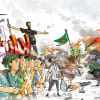Comrade Moni Singh and opposing neofascism

If you ask a young person in 2024 what fascism is, they may directly answer that fascism means dictatorship. If you ask what Nazism is, some may try to correlate. This is how the traditional narratives—and terminologies—of politics change. In today's Bangladesh, the old form of politics has resurfaced in a new shape. What we're witnessing is 21st century fascism: politics based on some form of supremacy. Where the accountability of the state, democracy and justice are missing. Traditional politics became all about repeating the same rhetoric and idealising personality cults. The ongoing discourse greatly irritated the youth. Party politics and blind allegiance to a party were failing to properly utilise the talents of the youth. So the youth of 2024 put their faith in their own strength. They aimed for the complete renovation of traditional politics.
On the one side, there were the helmet gangsters of authoritarianism. On the other, a student-led mass movement fighting in mortal combat. The state's oppressive forces were swept away like a grasshopper by the tsunami of the people. The power centre of misrule escaped and survived.
In the aftermath of the July uprising, I was reminded of the revolutionary Moni Singh, who raised his voice for justice on behalf of the oppressed people of Bengal. In the courtyards of the Hajongs and Bengalis, in the rice fields, he crafted his own weapon to fight the British colonial rulers wielding modern arms.
Today's youth must not fall victim to the fallacies of fantasy, fascism and consumerism. That is why it is crucial to understand the aspects of fascism in the 21st century. The trace of Benito Mussolini's fascism of the 1940s cannot be found now. A new brand of bloodthirsty fascism has taken root. But the youth of Bangladesh has not just uprooted this new brand of fascistic misrule—they have made the agenda of state reform inevitable. They have demanded we raise our voices—from the hills to the plains, in groups and in communities. The youth have issued a clarion call for inclusiveness.
In the aftermath of the July uprising, I was reminded of the revolutionary Moni Singh, who raised his voice for justice on behalf of the oppressed people of Bengal. In the courtyards of the Hajongs and Bengalis, in the rice fields, he crafted his own weapon to fight the British colonial rulers wielding modern arms.
Moni Singh honed his life of struggle during his youth. Fascism relies on the cult that survives. He struck a great blow at the root of that cult. At that time, he spoke about a new revolutionary political system, a social system without discrimination—that is, socialism. Standing in front of a leader like Netaji Subhas Chandra Bose, Moni Singh strongly protested against the discrimination towards workers committed by factory owners. If we look at his life of struggle, the brutal image of fascism and state authoritarianism is exposed in every chapter.
Today, in this era of great technological advancement, fascism has not changed its nature. It remains the same—oppressive of the people. It is important to note that today's fascism also uses modern technology and the power of AI to oppress people. The fascism of today's ruling class is therefore old in nature, but novel in its brutal expression. As a result, the face of the popular uprising against it is also unique. The movement is advancing by rejecting the narratives of traditional politics and political party structures. Hence, conventional calculations, thinking methods, and civil society actions stumble here.
Today, in this era of great technological advancement, fascism has not changed its nature. It remains the same—oppressive of the people. It is important to note that today's fascism also uses modern technology and the power of AI to oppress people. The fascism of today's ruling class is therefore old in nature, but novel in its brutal expression. As a result, the face of the popular uprising against it is also unique.
The BBC recently cited the opinion of American political scientist Lawrence Britt and his work "The 14 Characteristics of Fascism." This includes continuous promotion of nationalism, human rights abuses, fraudulent elections, corporate interests, benefits for the army, arbitrary control over the media and more. Remarkably, all these elements are present in Bangladeshi politics, albeit in a renewed form. Farcical elections, the so-called "midnight voting," looting of banks and financial institutions, handing over national oil and gas resources to foreign corporations, extrajudicial killings, nepotism, skyrocketing commodity prices and extensive benefits for government officials are all aspects of neo-fascism.
Now, the question is being raised as to whether the uprising has lost its momentum. Traditional politics failed to transform itself as expected. It could not contain the feelings of the masses. There has been no tested philosophy to build a society free from discrimination to guide today's anti-fascist rhetoric. On the other hand, the philosophy of a discrimination-free society was fully embodied before the revolutionary Moni Singh. That philosophy was Marxism, which all forms of fascism have repeatedly attempted to destroy.
Nevertheless, the revolutionary Moni Singh, like a phoenix, has returned to the ranks of the masses. In the guise of a winner, he has started a new level of struggle, in the streets, in the prison.
Remembering him on his 34th death anniversary with utmost respect. Red salute, Comrade Moni Singh!
Hasan Tarique Chowdhury is a lawyer at the Supreme Court of Bangladesh.
Views expressed in this article are the author's own.
Follow The Daily Star Opinion on Facebook for the latest opinions, commentaries and analyses by experts and professionals. To contribute your article or letter to The Daily Star Opinion, see our guidelines for submission.

 For all latest news, follow The Daily Star's Google News channel.
For all latest news, follow The Daily Star's Google News channel. 





Comments